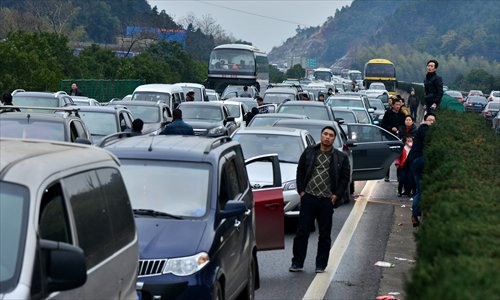HOME >> CHINA
Severe weather causes holiday migration chaos
By Fang Yang Source:Global Times Published: 2014-2-7 1:53:01

A man surveys traffic on the Shanghai-Kunming Highway on Wednesday. Inclement weather disrupted travel during the last two peak days of travel. Photo: CFP
Rain and snow have disrupted the journeys of millions of people traveling across the country after the Chinese lunar new year holiday, causing chaos during peak-day travel.
China's top weather authority issued a yellow alert for blizzards on Thursday morning, the final day of the holiday, saying snowstorms would hit provinces including Henan, Hubei, Anhui and Jiangsu from Thursday morning to Friday morning.
As more travelers departed from their families, complaints about the world's largest annual migration shifted from ticket-buying difficulties to return journey hardships.
The snow forced 69 highways to partially close on Wednesday, the Ministry of Transport said. A total 89.11 million road trips were made on Wednesday, 5.4 percent higher than last year.
Railway traffic was affected as some high-speed trains were capped at a maximum speed of 200 kilometers per hour, the Beijing Times reported, causing nearly 100 late arrivals on Wednesday.
Big cities like Beijing, Shanghai, Guangzhou and Shenzhen saw the largest returning population. Beijing railway authorities said 407,000 people arrived in the capital on Wednesday, china.com.cn reported.
Between complaining about late trains and planes, jammed highways and bad weather, some Chinese people began to wonder why they bothered returning at all.
"Big cities gather the most talent as well as resources and opportunities," Huang Dan, a Hubei native who works in Beijing, told the Global Times on Thursday.
Back from being the caring daughter and sister of her family, Huang dressed up as a white-collar worker again in her office at the Advanced Business Park in Beijing and plunged back into the faster pace of her daily work environment.
Despite the cutthroat competition, bad air and pricey housing, Huang said she still appreciates the more international environment and advanced urban planning.
"After all, young people like adventures, and small cities can hardly give you that," Huang said.
Wang Yuancheng, a Net user on Zhihu, a knowledge exchange website similar to Quora, also believe big cities provide a better platform for young people.
Wang shared his story of returning home from Shanghai, attracting a massive online response.
"Shanghai is a city that cares nothing except for your hard work," Wang said. In his third-tier city hometown, people focused more on background, connections and nepotism, he believed.
Young people like Huang and Wang must adjust to the difference between the city and their hometown, an expression of the continuing urban-rural economic imbalance in China's divided society.
Recently a rather sarcastic post gained online traction describing young people from small towns as "debutantes" in the big city, joking that their workplace English names contradicted their humbler hometown nicknames.
The post, while illustrating young people's confused identities, also reveals that life in the big city is often only fancy on the surface.
"Some will eventually leave big cities like Beijing due to heavy work pressure and the high cost of living," said Du Xiaoshan, an economist with the Rural Development Institute of the Chinese Academy of Social Sciences.
"In addition to opportunities, people also seek comfortable lifestyles," Du said.
Many young people find it costs too much time and energy to settle there, he noted.
"To attract talent back to their homes in small cities and towns, the key is to find suitable pillar industries and good job opportunities," Du said.
While believing the urbanization drive will reduce regional disparity, Du said there is no timetable for full elimination of the massive festival migration that is a cultural tradition and a sign of social progress.
Relocation of administrative and economic resources would change things a lot, suggested Wang Chunguang, a sociologist with the Chinese Academy of Social Sciences.
"Migration also follows the market rule," Wang told the Global Times. The implementation of central policies that boost development in underdeveloped regions would decide if underdeveloped regions would catch up, he believes.
China's transport system is put to the test during chunyun, the 40-day travel period which literally means "Spring Festival transport." During the first 20 days that ended Tuesday, about 121.22 million trips were made by train, up 13.6 percent from the same period last year, according to the China Railway Corporation.
Posted in: Society